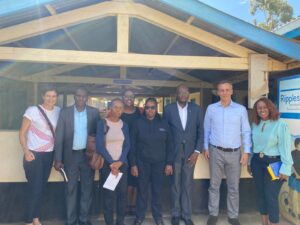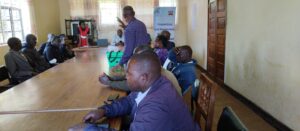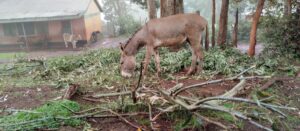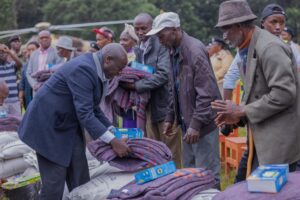President’s Speech at The 6th Extra-Ordinary Session
On curfews, we erected check-points with the hope that they will become a deterrence for unnecessary movement. But in some instances, the curfew enforcement points became outlets of corruption and unjust accumulation.
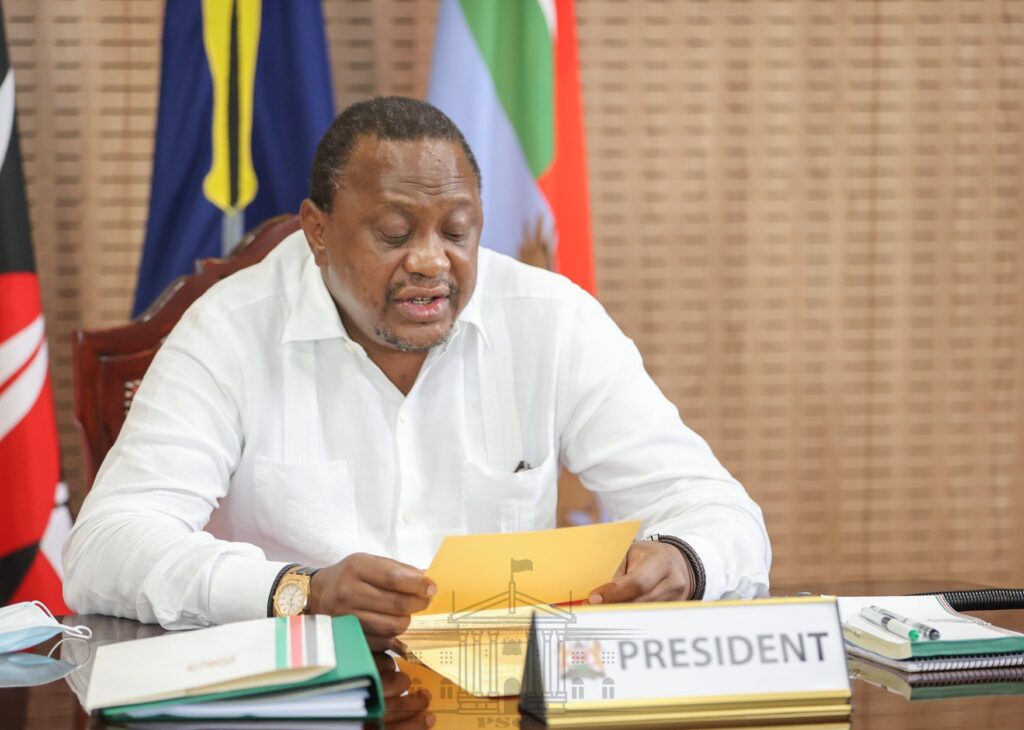
OPENING REMARKS BY PRESIDENT UHURU KENYATTA, DURING THE SIXTH (6TH) EXTRA-ORDINARY SESSION OF THE NATIONAL AND COUNTY GOVERNMENT CO-ORDINATION
Chair and Members of the Council of Governors,
Cabinet Secretaries present,
Ladies and Gentlemen,
Good Morning
Let me take this opportunity to welcome you all to the Sixth Extra-Ordinary Session of the National and County Government Coordination Summit.
I note with pleasure that each time we meet as a gathering of the two levels of governments, I am comforted that together, there is no problem too big for us.
And as I did indicate during the Third Extra-Ordinary Session of this Summit on 10th of June 2020, whenever we GATHER as a Summit, the consciousness of the entire nation is called to order.
The political dynamics of the moment are put asunder, and our only business becomes Kenya.
I am further reassured by the fact that, each time this gathering is convened, it also becomes a ‘fellowship of truths’. When we sit, we speak as one; not because we are always in agreement, but because we are not afraid of the truth.
We approach our issues surgically, and make prescriptions that hurt in the short-run, but heal in the long run. That is why I want us to be brutally honest with each other, today.
We must begin by asking some uncomfortable questions regarding our response to the COVID-19 pandemic.
We must ask ourselves whether we have done our very best to contain its spread? Then we must ask further whether what we consider to be our best, is it enough? Are there areas where we fell short and could have done better as Governments?
Did we backslide from our vigilance when we started flattening the curve and are there lessons we can learn from this relapse during the months of November and December?
And what about our staying power? Do we have enough stamina to take us through the uncertainties of this pandemic? Or are we waiting to succumb to the fatigue visited upon us by this fight?
Ladies and Gentlemen,
The Nation is asking us NOT to follow it; but to lead it. If the people have backslidden from the resilience they showed us during the first six months of the pandemic, they do not expect the LEADERS to backslide as well.
If the nation is succumbing to the fatigue created by the virus, it would be a tragedy if the LEADERS give in to the weariness as well. And if the people have fallen short of giving their best, we the LEADERS have to give, our all.
This moment provides a unique call to leadership. Although health interventions are critical to fighting the rising COVID numbers, leadership is what will reverse this escalation. You as the leaders of our 47 county governments, you all know that: “…leadership is not a position; it is action”.
In a situation of crisis, ‘action’ also means: “…knowing the way; going the way; and showing the way”. This is what is expected of us as LEADERS from the national to county levels.
I am persuaded that if we exercise collective leadership in the fight against this pandemic, we will reverse the upward surge of new infections.
And while at it, we must not be pushed to make popular decisions to appease the public. We must choose the bold over the popular, if it serves the country better.
Ladies and Gentlemen,
I want to identify only three elements of collective leadership that we must engage in. In choosing the three, I am cognizant of the fact that Health Interventions are critical to our fight against COVID -19. However, the paradigm must now shift from emphasis on health interventions to underscoring the management of human response to the pandemic.
If we are experiencing an escalation of infections country-wide, it is not because our health care system has failed. The crisis is as a result of failure to manage our human response to this pandemic. And this is what this Conference must address.
The first element of leadership that we must focus on is, compliance and enforcement. If this Summit is a ‘fellowship of truths’, we must admit that there is collective failure in the area of enforcement.
Although the wearing of a face mask in public is now a statutory requirement, we are facing enforcement challenges across the 47 counties of Kenya. Market places, trading centres and open-air pitches are full of crowds, without masks.
For the most part, this is not because the crowds cannot afford a mask. It is a problem of our two levels of government failing to enforce compliance to the COVID protocol.
Other enforcement challenges include CURFEWS, public meetings and drinking places.
On curfews, we erected check-points with the hope that they will become a deterrence for unnecessary movement. But in some instances, the curfew enforcement points became outlets of corruption and unjust accumulation.
The question to this Summit, therefore, is: is there a way that the national government could have coordinated better with the county governments to arrest such eventuality?
Or, is there a way we could have provided collective leadership to arrest the unexpected consequences of road-side rallies and bars that remained open beyond the required timeline?
The second element requiring our collective leadership is that of Early Warning and Early Response. Like enforcement, this is in the domain of human response. For instance, today we have counties that do COVID testing and they have to send their samples to neighbouring counties for analysis.
By the time the results are back, the infected have interacted for five days or so with non-suspecting victims, spreading the disease as they wait for results.
Yet the World Health Organization (WHO) has approved a faster way of testing COVID-19, using pre-qualified antigens that give you results faster and in your locality. Instead of sending samples to another county, each county can use this WHO intervention to localize testing at the county level. But for this to happen, leadership has to kick in.
Leadership at the county level has to “…Know the way, go the way, and show the way”. It has to identify the solution provided by WHO for quick testing, acquire it and implement it, on the ground. This quick acquisition and deployment of the WHO prequalified testing kit, will make the difference. We must make it prevalent in our counties as part of our collective leadership and responsibility.
The third element of leadership has to do with our irreducible minimum. Yes, we can manage the human response to the pandemic through enforcement and early response. However, this has to tie back to what we identified in March as our COVID-19 Irreducible Minimums. Although this is not part of the human response, leadership in ensuring that these minimums are met, is critical.
Ladies and Gentlemen,
We must be truthful to ourselves on this. Do we have the irreducible minimums to handle the turns and twists of this pandemic in our counties? Do we have enough isolation beds, ICU facilities, Oxygen equipment and the bare minimum of 300 bed capacity?
If we have met these requirements, should the pandemic demand that we expand our health facilities in the coming months, do we have what it takes to do so in a speedy and timely manner?
Ladies and Gentlemen,
You will agree with me, preparedness, in times of crisis, requires creative leadership. The question I want us to ponder in this Conference is: do we have this form of leadership?
Ladies and Gentlemen,
I have one last point of reflection I want to invite you to consider in this Summit. The COVID-19 pandemic has put pressure on our education system and calendar.
Collectively, we need to come up with leadership solutions that provide us with a feasible way forward.
This will not be a national government affair only. It requires the involvement of all of us. As we deal with enforcement, early warning and response; and ensuring that the irreducible minimums are in place, we must not leave the education sector, behind.
Innovative thinking on how to re-open our schools and learning institutions must be a shared responsibility between the national and county governments.
In conclusion, I invite this Summit to make bold, and, not popular, decisions. I implore you to focus on your role as leaders, not managers. Look at the big picture and how it will affect the country and your role in coming up with solutions to solve the problem.
But fundamentally, focus on how we can enhance our human response to this pandemic in the areas of enforcement; early warning and response; and ensuring country-wide irreducible minimums, are met.
I wish all of us fruitful deliberations, with solutions that will help our country navigate the second wave of this pandemic. But fundamentally, I wish you all a truthful session of deliberations.
Thank You.
God Bless You; And God Bless Kenya.


